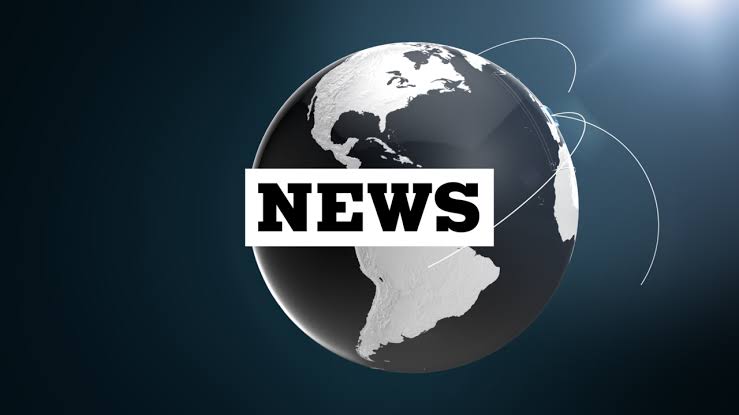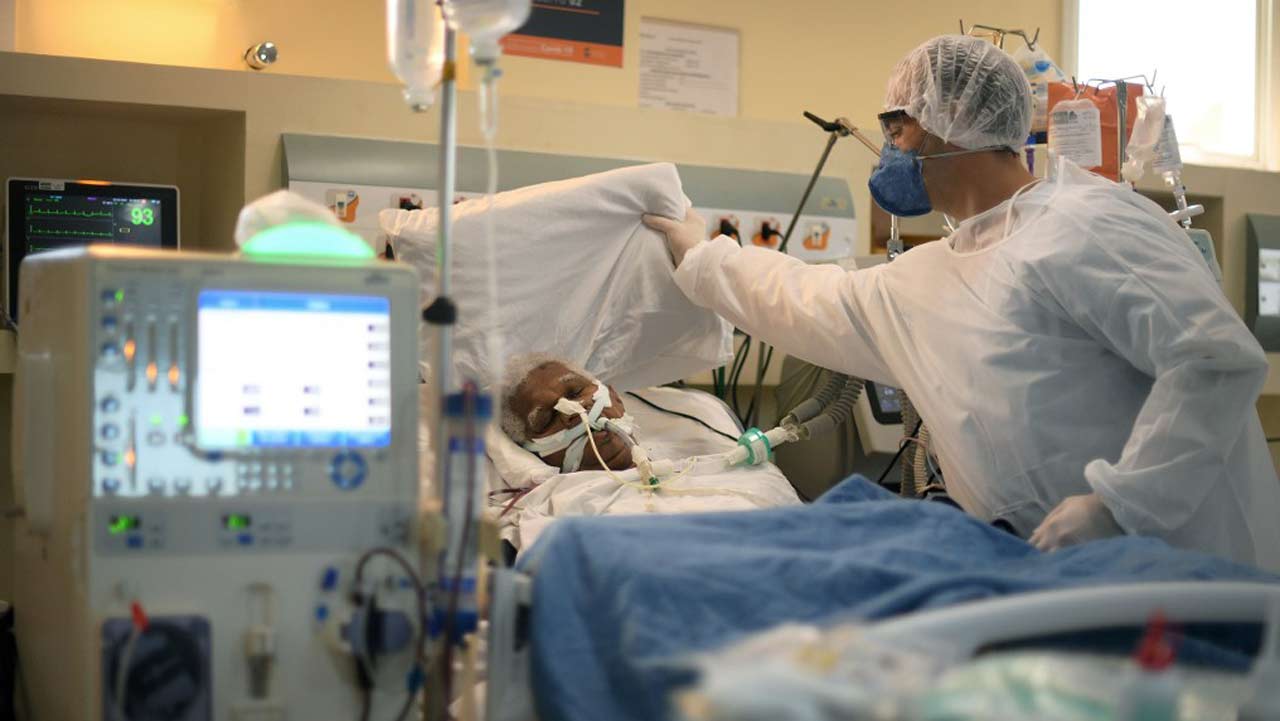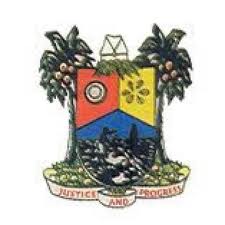Since the importation of the deadly Ebola virus into the country by the now deceased Liberian, Patrick Sawyeer on July 20, one of the health officials who attended to him has been confirmed dead. Another female doctor, including seven persons who had direct have tested positive to the virus. WOLE OYEBADE writes on the emergency measures being put in place by both the federal and Lagos state officials
The worst fear of many Nigerians was confirmed on Wednesday. "We have a problem on our hands and it is a national emergency," says the Minister of Health, Prof. Onyebuchi Chukwu, while breaking the news that the Ebola Virus Disease (EVD) has finally claimed its first victim in Nigeria. The confirmation puts to rest, doubts and denials on disease's outbreak in Nigerian, following the Patrick Sawyer episode in Lagos. No fewer than seven cases have so far been confirmed and Lagos State health officials are now on the heels of a handful of secondary contacts.
The Nigerian matron that died in Lagos on Tuesday had direct contact with the US-born Sawyer, who also died of Ebola virus in Lagos on July 25. The other five suspected cases are under watch at a facility in Lagos.
There is no cure or vaccine for Ebola - but patients have a better chance of survival if they receive early treatment. According to the Minister, those who have so far died include the "index patient," who brought the virus to Lagos on July 20, and the nurse who treated him.
Emergency measures
The Federal Government has established a 24-hour Emergency Operations Centre, headed Dr Faisal Shuaibu. Chukwu has also appointed a Director of Communication and Community Mobilisation, Prof. Bayo Onajole of the Lagos University Teaching Hospital, who will be based in Lagos. He said: "We are embarking on the recruitment of additional health personnel to strengthen the team who are currently managing the situation in Lagos. We are making arrangements to procure isolation tents to quicken the pace of providing isolation wards in all the states of the federation and the Federal Capital Territory (FCT). We are also setting up a special team to provide counseling and psychosocial support to patients, identified contacts and their families.
The Lagos State Commissioner for Health, Dr Jide Idris said the state government would be providing life insurance cover for any doctor, nurse and other experts that undertake to work with isolated patients, adding that the health sector needs more hands, "because we have moved from the stage of primary contacts to secondary contacts."
Idris also stated: "We are tracing all the people that had contact, not just with Sawyer, but those that had contact with the health workers and others that have died. We have identified 27 secondary contacts already. We are tracing the addresses of others. It is a tedious task, because we will also be taking their blood samples for testing and we will be monitoring them."
The commissioner, however, appealed to members of the Nigerian Medical Association (NMA) to resume work and set aside their grievances, as the situation has now become an emergency. Idris said the state government would also be evacuating tuberculosis patients receiving treatment at the Infectious Diseases Hospital (IDH) at Yaba (Lagos) to another hospital to accommodate more suspected and isolated Ebola cases.
"If we need to evacuate any hospital to ensure that we contain this disease, we will do it. If we have to take suspected cases to the Lagos State University teaching Hospital (LASUTH), we will do it. If we need to take decisions that will be inconvenient for some people but beneficial to the larger population, we will do it." he said.
Fear grips doctors
Despite Idris' pleas, two members of the Nigerian Medical Association (NMA) yesterday told The Guardian "it is just not the best time to resume to work." They were of the view that virus puts doctors more at risk than any other member of the society, given "the little or no protection in several public health facilities."
On the contrary, chairman of the NMA, Lagos branch, Dr Tope Ojo, said doctors in the state have volunteered to join the team of experts managing patients at the IDH ,Yaba. Ojo said: "Strike or no strike, we must respond to emergencies. Our doctors are at the Mainland Hospital, Yaba, where isolated contacts are being monitored. There are seven committees working on the management of the disease at the centre in Lagos and our members are part of the various committees. "When there is disaster outbreak, there will be a response by the NMA. The issue of strike will not affect our involvement. The NMA is a responsible body and I can assure you that in as much as we don't pray for natural disasters, NMA will definitely respond. We worked all through the night trying to find out who should be here or there today," he added.
On his colleagues' fears, Ojo said: "Look at the protective measures that doctors in Liberia and Guinea wear. They are well protected, yet some of them still caught it. Our doctors are worried about the danger it (Ebola) poses to their lives and they need to be reassured. We understand their fears and we are making moves to confirm the level of preparedness of the government for doctors."
Lagos, Ogun, Ondo in emergency meeting
In a related development, governors of the Southwest geopolitical zone have held an emergency meeting in Lagos, over the disease. Governors present were Babatunde Fashola (SAN) of Lagos, Ibikunle Amosun of Ogun State, Olusegun Mimiko of Ondo State, Dr Kayode Fayemi of Ekiti State, while Abiola Ajimobi of Oyo State was represented his deputy, Moses Adeyemi.
They called on the Federal Government to police the nation's borders to avert further spread of the disease.
Amosun told reporters that his state was more prone and at risk of the deadly disease with several illegal borders with neighbouring West African countries, adding, "Ogun doesn't have the capacity to man these borders." He said: "Indeed, it's not our responsibility to man these borders. We should collaborate with the Federal Government, which is what we are doing. At the last count, we had about 70 (illegal borders) that you can take containers and trailers through, even on a normal day. People hardly use the official borders. It's the illegal ones that you see them packing all those smuggled cars through and now, it becomes more worrisome by the time you look at the fact that everybody now is taking proactive measures of banning flights."
According to him, "if people cannot fly, you know obviously they would find a way of entering the country, which is why we are calling the federal government to assist us. We need men and materials to man those borders. As we speak, we have about 68 Hilux vans manning those borders and not just vehicles alone, we need the manpower of immigration, customs and even our medics have to be there.
Why Ebola is so dangerous
The Ebola outbreak in Guinea, Liberia, Sierra Leone and Nigeria is the world's deadliest to date. According to the United Nations (UN), 932 people have died as health officials struggle to control the virus.
Ebola is a viral illness with the initial symptoms of a sudden fever, intense weakness, muscle pain and a sore throat, according to the World Health Organisation (WHO). But that is just the beginning. Subsequent stages are vomiting, diarrhoea and - in some cases - both internal and external bleeding.
The disease infects humans through close contact with infected animals, including chimpanzees, fruit bats and forest antelope. It then spreads among humans through direct contact with infected blood, bodily fluids or organs, or indirectly through contact with contaminated environments. Even funerals of Ebola victims could pose a risk, if mourners have direct contact with the body of the deceased. The incubation period can last from two days to three weeks, and diagnosis is difficult. The disease has so far been mostly limited to Africa, although one strain has cropped up in the Philippines and Saudi Arabia.
Ebola was first discovered in the Democratic Republic of Congo (DRC) in 1976 and has since affected countries further east, including Uganda. This outbreak is unusual because it started in Guinea, which has never before been affected, and is spreading to urban areas. From Nzerekore, a remote area of southeastern Guinea, the virus has spread to the capital, Conakry, and neighbouring Liberia and Sierra Leone.
The medical charity, Medecins Sans Frontieres (Doctors Without Borders) has described the way the cases were scattered in multiple locations across Guinea, hundreds of kilometres apart, as unprecedented. All previous outbreaks were much smaller and occurred in places where Ebola was already known - in Uganda and the DRC for example.
Precaution
The WHO has advised individuals to avoid contact with Ebola patients. It also counseled: "Do not touch anything - such as shared towels - which could have become contaminated in a public place. Caregivers should wear gloves and protective equipment, such as masks, and wash their hands regularly." The world body also warned against the consumption raw bush meat and any contact with infected bats, monkeys and apes. "Fruit bats in particular are considered a delicacy in the area of Guinea where the outbreak started."
The Coordinator, Nigeria Centre for Disease Control (NCDC), Dr. Abdulsalami Nasidi, has appealed that bats and monkey-eating or worshipping communities should for now desist from the act for safety reasons.
His words: "It has to be said that there are some communities that worship animals like bats and keep them in their houses. This is the time to be very careful. Secondly, I want to appeal to all Nigerians that in any case, should anyone die of bleeding related symptoms, burial rites must be completed under close supervision of the public health officers. "If a person died from Ebola, his or her body will have a very high viral load. Bleeding is a usual symptom of the disease prior to death. Those who handle the body and come into contact with the blood or other body fluids are at greatest risk of catching the disease."
Nasidi further warned that Nigerians must be wary of Healing Homes. He said: "We heard from reliable sources that patients from neighbouring countries are coming into Nigeria because of the powers of these Healing Houses. It is not only Lagos but all states across the country that have Healing Houses should watch out."
In March, Liberia's health minister advised people to stop having sex, in addition to existing advice not to shake hands or kiss. The WHO affirmed men could still transmit the virus through their semen for up to seven weeks after recovering from Ebola. The doctor leading Sierra Leone's fight against the virus has also died, prompting the country's president to declare a public health emergency
Testimonials
The number of infected people in Guinea, according to the WHO, has risen to 208, 136 of which have died. About half of the cases have been confirmed in a laboratory - earlier cases were not tested. One survivor, who asked not to be named, told the BBC his story: "The symptoms started with headache, diarrhoea, pain in my back and vomiting. The first doctor I saw at a village health centre said it was malaria - it was only when I was brought to a special unit at the hospital in (the capital) Conakry that I was told I had the Ebola virus. I felt really depressed - I had heard about Ebola, so when the doctors told me, I was very scared. I tried to be positive. I was thinking about death, but deep inside, I thought my time had not come yet and I would get over it. That's how I overcame the pain and the fear.
"Doctors from the Charity Medecins Sans Frontiers (MSF) were here to comfort me and give their moral support. I tried to stay positive although I was scared when I saw my relatives dying in front of me. There was a moment when I thought I might die when I lost two of my uncles and their bodies were taken away. That night, none of us could sleep - we thought we would never make it to the morning. "Some doctors from MSF came to collect and wrap the bodies and sterilise the area. It all happened in front of us. A short while after I was admitted to the hospital for treatment, I started feeling better, step-by-step. At first, I was scared to eat as I thought I would be sick, but after a while I took a few drops of water and realised it was okay and the diarrhoea gradually stopped as well.
"The doctors would come to see me and ask questions and one day, nearly all my answers were "no." The doctors were pleased and I realised that I would make it. That was a very powerful feeling for me. It was a great feeling when I walked out of the hospital. We had a little celebration with the doctors, all the nurses and the people who had been waiting for me. They took pictures of me, they shook my hands. I saw that they felt safe touching me and I realised I was better. I was really happy on that day. Now I feel good although I sometimes get some pain in my joints. I prefer not be identified in the media. Many people are aware that I had the disease but many others are not. We have been through difficult times. People were afraid of us.
He continued: "Usually when someone dies, people visit you. But when we lost one, then two, three, four members of our family, nobody came to visit us and we realised we were being kept at bay because of fear. It gets even worse if everybody hears about your condition on the radio and television. Even people close to us, neighbours and relatives, are met with suspicion when they mention that they know us. Immediately, the other person takes two or three steps back out for fear of contracting the virus. People are very poorly informed about the disease. Nine people in my family had the virus in total. My wife and my cousin survived too, so it was the three of us out of nine."
However, Liberian President Ellen Johnson Sirleaf has declared a State of Emergency for 90 days, as the country grapples with the outbreak. Speaking on national television, she said some civil liberties might have to be suspended. Sirleaf said in a statement that the government and people of Liberia required "extraordinary measures for the very survival of our state and for the protection of the lives of our people".
She added: "Ignorance and poverty, as well as entrenched religious and cultural practices, continue to exacerbate the spread of the disease".
Observers say the Ebola crisis in Liberia got worse because many people were keeping sick relatives at home instead of taking them to isolation centres. Amid international concerns over the spread of the virus, United States President, Barrack Obama said that the illness "can be controlled and contained very effectively if we use the right protocols.
His words: "The countries affected are the first to admit that what's happened here is, the public health systems have been overwhelmed. They weren't able to identify and then isolate cases quickly enough. As a consequence, it spread more rapidly than has been typical with the periodic Ebola outbreaks that occurred previously."
Saudi Arabian authorities have also announced said that a Saudi man, who was treated for Ebola-like symptoms after visiting Sierra Leone has died at a hospital in Jeddah. Two US aid workers who contracted Ebola in Liberia appear to be improving after receiving an unapproved drug, ZMapp, developed by the Mapp Biopharmaceutical, based in San Diego, United States.
ABUJA: Training Schedule for Basic Life Support BLS, Pediatric Advanced Life Support (PALS), Advanced Cardiovascular Life Support ACLS, First Aid, CPR, AED
PORTHARCOURT: Training Schedule for Basic Life Support BLS, Pediatric Advanced Life Support (PALS), Advanced Cardiovascular Life Support ACLS, First Aid, CPR, AED
LAGOS: Training Schedule for Basic Life Support BLS, Pediatric Advanced Life Support (PALS), Advanced Cardiovascular Life Support ACLS, First Aid, CPR, AED




